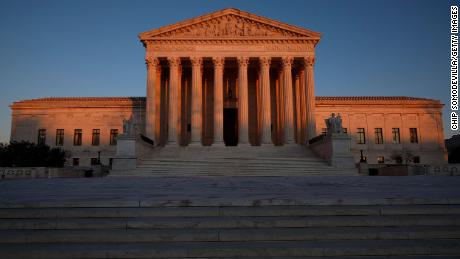Partisan opinions littering the Supreme Court draft decision for Roe v. Wade.

May 27, 2022
On Monday, May 2, Politico published an article holding a now infamous 98-page draft majority opinion written by Justice Samuel Alito, which wrote that the decision made in the landmark Roe v. Wade case must be struck down. This draft opinion, which was leaked to Politico, has led to widespread fear from activists who are calling for bodily autonomy and reproductive rights to be upheld by the Supreme Court. In this time of confusion and anxiety, it is necessary that all those seeking to speak on this draft opinion first hear what is held within it.
This 98-page opinion is lengthy, but the copy sourced from Politico has already had many of the major paragraphs and important points highlighted for readers to navigate the document with ease. In one of these highlighted boxes, Justice Alito writes that Roe must be overturned because the Constitution makes no reference to abortion, and that no right to abortion is “implicitly protected by any constitutional provision.” The document then states that the Fourteenth Amendment, which holds the Due Process Clause, can only defend rights that are “deeply rooted in this Nation’s history and tradition.” Because of this, the majority decision rules that Roe has no constitutional basis. This would also threaten other rights that were not amended to the Constitution, including the rights to privacy and the right to marry, which were also based on the Due Process Clause of the Fourteenth Amendment. Depending on one’s stance on Roe and other similar cases, this may seem unfounded, yet it is entirely within the rights of the Supreme Court to decide. A genuine issue, regardless of one’s political stance, comes in the form of statements made by Alito on behalf of the Court and the Nation at large.
Returning to the first highlighted statement in the document, Justice Alito writes that when the Roe v. Wade case was decided, the 30 states that still prohibited abortion were “liberalizing” their laws, and that “Roe abruptly ended that process. It imposed the same highly restrictive regime on the entire Nation, and it effectively struck down the abortion laws of every single state.” The next line is not highlighted, but should still be considered: “…it sparked a national controversy that has embittered our political culture for a half-century.” Justice Alito continues to allude to the political climate in the nation, writing that “far from bringing about a national settlement of the abortion issue, Roe and Casey have inflamed debate and deepened division.” From then on, the document says it should be the right of the States, not the Supreme Court, to decide on abortion.
Whether or not you agree with the Roe decision, this document shows the Supreme Court acting in an unequivocally partisan manner. Justice Alito, in this document, has expressed beliefs that are held by the political parties defending laws against abortion and has expressly stated the political turmoil in the United States multiple times as evidence against the Roe decision. However, there are two major flaws with the use of political speech in this document. The first fault of the use of our country’s political status is that multiple polls have shown that most voters oppose overturning Roe, and so overturning it could cause the heightening of tensions throughout the country, and early signs of this exact strain on our nation’s public are beginning to show. The second fault is more major, however: if the Supreme Court takes an expressly political stand, it will undermine many of our systems of government as we know them.
Justices Amy Coney Barrett and Stephen Breyer have both stated that it is imperative that the Court remain impartial to political spheres, with Justice Breyer arguing that the Supreme Court’s legitimacy “depends upon the public perceiving that its decisions are based on the rule of law rather than partisan politics.” Of course, it is easy to see why the Supreme Court should not be a partisan body. Justices are meant to interpret the law impartially, and with only the judicial review of their peers on the Supreme Court. If the Court was partisan, that would mean that the law could be unjustly determined and undermined by the Supreme Court simply because their party wills it so, and there would be virtually no means of checking the Court. This, alongside the near indefinite tenure of Supreme Court Justices, leads to a rather bleak future for the nation with a partisan Supreme Court.
Ultimately, regardless of your stance on Roe, many of the statements in this draft decision hint at a partisan bias in the Supreme Court, which many Americans had been worried would be the case after the last few years. This draft opinion could result in a Supreme Court that is unafraid to act in a partisan manner, which could do innumerable damage not only to the Nation’s trust in the Court, but to the future of politics and of the Supreme Court itself.


